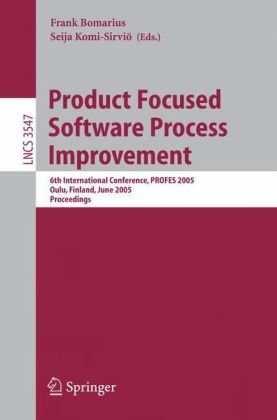

Most ebook files are in PDF format, so you can easily read them using various software such as Foxit Reader or directly on the Google Chrome browser.
Some ebook files are released by publishers in other formats such as .awz, .mobi, .epub, .fb2, etc. You may need to install specific software to read these formats on mobile/PC, such as Calibre.
Please read the tutorial at this link: https://ebookbell.com/faq
We offer FREE conversion to the popular formats you request; however, this may take some time. Therefore, right after payment, please email us, and we will try to provide the service as quickly as possible.
For some exceptional file formats or broken links (if any), please refrain from opening any disputes. Instead, email us first, and we will try to assist within a maximum of 6 hours.
EbookBell Team

4.1
60 reviewsThe Eight International Conference on Product-Focused Software Process Impro- ment (PROFES 2007) brought together researchers and industrial practitioners to report new research results and exchange experiences and findings in the area of process and product improvement. The focus of the conference is on understanding, learning, evaluating, and improving the relationships between process improvement activities (such as the deployment of innovative defect detection processes) and their effects in products (such as improved product reliability and safety). Consequently, major topics of the conference include the evaluation of existing software process improvement (SPI) approaches in different contexts, the presentation of new or mo- fied SPI approaches, and the relation between SPI and new development techniques or emerging application domains. This year’s conference theme focused on global software development. More and more products are being developed in distributed, global development environments with many customer–supplier relations in the value chain. Outsourcing, off-shoring, near-shoring, and even in-sourcing aggravate this trend further. Supporting such d- tributed development requires well-understood and accurately implemented devel- ment process interfaces, process synchronization, and an efficient process evolution mechanisms. Overcoming cultural barriers and implementing efficient communi- tion channels are some of the key challenges. It is clear that process improvement approaches also need to consider these new development contexts.